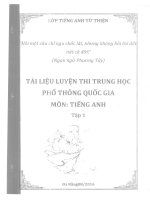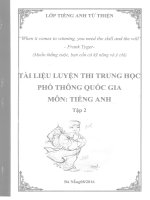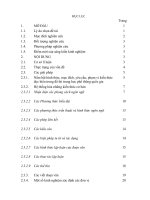Đọc hiểu luyện thi cấp tốc môn tiếng anh
Bạn đang xem bản rút gọn của tài liệu. Xem và tải ngay bản đầy đủ của tài liệu tại đây (58.13 KB, 7 trang )
Luyện thi cấp tốc môn Tiếng Anh
Trang 240
Passage 2: Choose the item among A, B, C or D that best answers the questions about the
passage.
The rules of etiquette of American restaurants depend upon a number of factors: the
physical location of the restaurant, e.g. rural or urban, the type of restaurant, e.g. informal
or formal, and certain standards that are more universal. In other words, some standards of
etiquette vary significantly while other standards apply almost anywhere. Learning the
proper etiquette in a particular type of restaurant in a particular area may sometimes
requyre instruction, but more commonly, it simply requyres sensitivity and experience. For
example, while it is acceptable to read a magazine in a coffee shop, it is inappropriate to
do the same in a more luxurious setting.
And, if you are eating in a very rustic setting, it may be line to tuck your napkin into
your shirt, but if you are in a sophisticated urban restaurant this behaviour would
demonstrate a lack of manners. It is safe to say, however, that in virtually every restaurant
it is unacceptable to indiscriminately throw your food on the floor. The conclusion we can
most likely draw from the above is that while the types and locations of restaurants
determine etiquette appropriate to them, some rules apply to all restaurants.
1. With what topic is this passage primarily concerned?
A. Rules of etiquette
B. Instruction in proper etiquette
C. The importance of good manners
D. Variable and universal standards of etiquette
2. According to the passage, which of the following is a universal rule of etiquette?
A. Tucking a napkin in your shirt
B. Not throwing food on the floor
C. Reading a magazine at a coffee shop
D. Eating in rustic settings
3. What does the word "it" in the first paragraph refer to?
A. Learning the proper etiquette
B. Clear instruction
C. Knowing the type of restaurant
D. Sensitivity
4. Which of the following words is most similar to the meaning of "rustic" in the second
paragraph?
A. agriculture
B. ancient
C. unsophisticated
D. urban
5. Which of the following is closest in meaning to the word "tuck” in the second
paragraph?
A. put
B. set
C. hold
D. fold
6. The word "sophisticated" in the second paragraph could best be replaced by_____
A. expensive
B. cultured
C. famous D. exclusive
7. The word “manners” in the second paragraph could best replaced by which of the
following?
A. experience
B. character
C. ceremony
D.tact
8. the author uses the phrase “safe to say” in the second paragraph in order to demonstrate
that the idea is _____
A. somewhat innocent
B. quyte certain
C. very clear
D. commonly reported
9. The word “indiscriminately” in the second paragraph could best be replaced by which of
the following?
A. randomly
B. angrily
C. noisily
D. destructively
10. What is the author's main purpose in this passage?
A. To assist people in learning sophisticated manners.
B. To describe variations in restaurant manners.
C. To simplify rules of restaurant etiquettes
D. To compare sophisticated and rustic restaurants.
Trang 242.
Passage 4: Choose the item among A, B, C or D that best answers the questions about
the passage.
Psychologists have debated a long time about whether a child's upbringing can give it
the ability to do outstandingly well. Some think that it is impossible to develop genius and
say that it is simply something a person is born with. Others, however, argue that the
potential for great achievement can be developed. The truth lies somewhere between these
two extremes.
It seems very obvious that being born with the right qualities from gifted parents will
increase a child's ability to do well. However, this ability will be fully realized only with
the right upbringing and opportunities. As one psychologist says, “To have a fast car, you
need both a good engine and fuel.“
Scientists have recently assessed intelligence, achievement, and ability in 50 sets of
identical twins that were separated shortly after birth and brought up by different parents.
They found that achievement was based on intelligence, and later influenced by the child’s
environment.
One case involving very intelligent twins was quoted. One of the twins received a
normal upbringing, and performed well. The other twin, however, was brought up by
extremely supportive parents and given every possible opportunity to develop its abilities.
That twin, though starting out with the same degree of intelligence as the other, performed
even better.
This case reflects the general principle of intelligence and ability. The more favorable
the environment, the more a child's intelligence and ability are developed. However, there
is no link between intelligence and the socioeconomic level of a child’s family. In other
words, it does not matter how poor or how rich a family is, as this does not affect
intelligence.
Gifted people cannot be created by supportive parents, but they can be developed by
them. One professor of music said that outstanding musicians usually started two or three
years earlier than ordinary performers, often because their parents had recognized their
ability. These musicians then needed at least ten years' hard work and training in order to
reach the level they were capable of attaining.
People who want to have very gifted children are given the following advice:
• Marry an intelligent person.
• Allow children to follow their own interests rather than the interests of the parents.
• Start a child's education early but avoid pushing the child too hard.
• Encourage children to play: for example, playing with musical instruments is
essential for a child who wants to become an outstanding musician.
1. The upbringing of highly intelligent children requires______
A. an expensive education
B. good musical instruments
C. parental support and encouragement
D. wealthy and loving parents
2. The word "others” used in the first paragraph refers to ____
A. other people
B. other scientists
C. other children
D. other geniuses
3. When scientists studied intelligence and ability in twins, they found that________
A. ability depends mainly on intelligence and achievement
B. intelligence and development are irrelevant to ability
C. ability depends both on intelligence and on environment
D. different twins generally have different levels of ability
4. Scientists chose twins for their study because
___
A. each twin has the same environment as his/her twin
B. they are born, into the same family, hence the same upbringing
C. they have the same economic background and hence the same opportunities
D. they have the same genetic background, usually with similar intelligence
5. How were great musicians different from ordinary musicians in their
development?
A. Their ability was realized at an early stage and then nurtured.
B. They practice playing their instruments for many years.
C. They concentrated on music to the exclusion of other areas.
D. They were exceptionally intelligent and artistic.
6. The writer advises that gifted children should be allowed to follow_____
A. their own interest
B. their parents’ interests
C. only their interests in musical instruments
D. only their interests in computer games
7. When encouraging their gifted children, parents should avoid______
A. pushing their children too hard
B. letting them play their own way
C. permitting them to follow their own interests
D. starting their education at an early age.
8. The remark: "To have a fast car, you need both a good engine and fuel" in the passage
means that in order to become a genius______
A. you need to have good health and good nourishment
B. you need intelligence and you need to develop it
C. you should try to move quickly and efficiently
D. you must nourish your brain and train your muscles hard
9. The word "favorable" in the passage mostly means
______
A. “good for someone and making him/her likely to be successful”
B. "helping somebody to be more intelligent compared to other people"
C. "of high quality or an acceptable standard"
D. "under the control or in the power of somebody else”
10. All of the following statements are true EXCEPT____
A. educational development depends completely on economic well-being
B. a child's intelligence is influenced by that of his/her parents
C. to become successful, a child needs both native intelligence and development
D. studying different twins is a useful scientific procedure
Trang 250
Passage 10. Choose the item among A, B, C or D that best answer the questions
about the passage.
Baseball has been dubbed "America's favorite sport”, and many fans contend that there
is no greater thrill than watching a good pitcher throw the ball skillfully in a series of
expertly delivered “fast" and "curve" balls. Two such pitches the “rising fastball” and the
"breaking curveball" are particularly exasperating to batters because these balls tend to
veer in one direction or the other just as they reach home plate. The "rising fastball”
zooms forward only to jump up and over the bat as the batter swings. The "breaking
curveball” curves toward home plate, but plunges downward unexpectedly at the last
moment. Batters attempt to anticipate these pitches, and respond accordingly, while
pitchers work at perfecting their "fast" and "curse" ball deliveries.
But according to studies conducted by a team of engineers and psychologists, the "rising
fastball" and the “breaking curve-ball" do not actually exist, they are merely optical
illusions. The studies revealed that batters perceive the ball as approaching more slowly or
falling more quickly than it actually is, and it is this misperception that produces the visual
illusion. Batters tend to have difficulty tracking a ball continuously as it approaches and
will briefly divert their eyes to the spot where they think the ball will cross the plate. When
a hatter has misjudged the speed or angle of a pitch, and shifts his or her gaze in this way,
the ball will appear to suddenly rise or dip. and the batter will often miss.
How will this finding affect "American favorite pastime”? No doubt some will
vehemently reject the notion that the “rising fastball" and the “breaking curveball" are
mere illusions. But for others, the findings may imbue the game with a new level of
intrigue as batters attempt to respond to pitches that don't exist.
1. What does this passage mainly discuss?
A. the difference between fastballs and curveballs
B. America’s favorite pastime
C. illusions about the movements of pitched bulls
D. perceptional problems among baseball players
2. Which of the following words could best replace the word "thrill'' in the first paragraph?
A activity
B. excitement C. remedy D. issue
3. The word “exasperating" in the first paragraph could best be replaced by which of the
following?
A. challenging
B. exhausting C. exciting
D. frustrating
4. The word “zooms” in the first paragraph is closet in meaning to which of the following?
A. falls
B. rolls
C. speeds D. Bounces
5. Which of the following words could best replace the word “plunges” in the first
paragraph?
A. drops
B. withdraws
C. emerges D. tips
6. According to the author, why is it difficult for the batter to hit the “rising fastball" and
the "breaking curveball”?
A. because the ball approaches too quickly
B. because the ball veers just before reaching home plate
C. because the batter misjudges the pitcher's intention
D. because the batter misjudges the speed and angle of the ball
7. What does the word “they" in the second paragraph refer to?
A. the "rising fastball" and the "breaking curveball”
B. the engineers and psychologists
C. the research studies
D. the optical illusions
8. According to the passage, how is the illusion of the "rising fastball" and the "breaking
curveball produced?
A. by the pitcher's delivery
B. by the batter's failing to track the ball accurately
C. by the speed and angle of the ball
D. by the studies of engineers and psychologists
.
9. Which or .he following could best replace the word “vehemently” in the third
paragraph?
A. certainly
B. impassively
C. socially
D. furiously
10. The word “imbue” in the third paragraph is closet in meaning to which of the
following?
A. fill
B. spoil
C. affect
D. change









